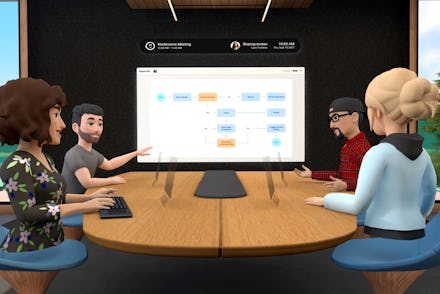As the coronavirus pandemic continues to surge due to the Delta variant, workplaces across the country are debating whether or not it's safe to bring their employees back into the office. Well, Facebook has a solution: Give Facebook a ton of money and make your office a virtual one. On Thursday, the company announced Horizon Workrooms, a virtual office that lets workers don a virtual reality headset and remotely collaborate with coworkers.
To understand Workrooms, think of it like a souped-up Zoom call. Put on an Oculus Quest 2 headset (friendly reminder that Facebook owns Oculus) and you are transported to a virtual office, where you will be able to see avatar versions of your office mates — except they are all legless, for some reason. Built into the room are some features for communicating and working together: Drawing pads and white boards let workers collaborate in the shared space, and workers can use a virtual projector to share slideshows or stream video for the room. Workrooms also tries to make things feel a bit more immersive than your standard video conference: Arm and hand tracking create more realistic body movements and spatial audio technology makes it sound like a voice is coming directly from whoever is speaking.
So with all that said, taking Workrooms entirely at face value, here's a question: Who in the goddamn world is this for? Most people who own virtual reality headsets have them for gaming purposes, and there really are not that many of them out there — just 26 million people globally own a VR headset, according to tech consulting firm Omdia. This isn't a simple solution where people can pick up a device they already own and beam in to a Workroom. Most people are going to have to drop at least $300 just to get their hands on a headset that is compatible with the technology. Surely Facebook would like businesses to spend thousands of dollars to equip their office with these headsets, as it desperately try to juice sales for the company that it spent $2 billion to acquire.
And let's say that works: Some corporations get super gung-ho about Workrooms and send all their workers a Quest 2 headset so they can virtually collaborate. Are we sure anyone actually wants to do that? Zoom fatigue is real, and it isn't going to be solved by having to be constantly performing for your virtual workmates. Studies have found that long conference calls take a toll on people, as does having to be on camera and in view of others all day long.
Facebook's solution promises to negate some of the things that make Zoom fatigue worse (you don't have to see yourself on camera and body language helps the brain process nonverbal cues), though it also comes with its own health concerns. It isn't uncommon for people to experience headaches, eye strain, dizziness, or nausea after using a VR headset for an extended period.
Facebook is well aware of this, by the way. According to The Washington Post, Andrew Bosworth, the head of Facebook Reality Labs, has to take a break from using his company's own headset after one hour of use because he experiences overheating. But sure, let's slap these things on the heads of office workers and have them burn their eyes out of their head so they can hang out in virtual reality all day for the sake of novelty.
Workrooms is one of the first steps that Facebook is taking toward building out its "metaverse," the company's dream of creating a massive, interconnected virtual world where you can do and build anything. It's like everyone forgot that the virtual worlds that inspired these ideas, whether it's Snow Crash or Ready Player One, are almost universally warnings about how miserable we all will be in these virtual worlds. Welcome to Workrooms, enjoy your dystopia!
